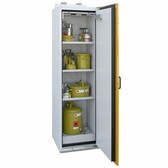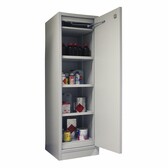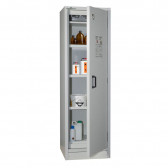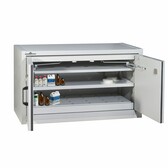Virtually all of us deal with hazardous substances on a daily basis, although we are not fully aware of it. They simply have a different name in everyday life, such as oil, petrol, acid, paint, glue or solvent. However, not everyone is aware that these are dangerous agents and should be stored in a hazardous substance storage facility.Any entity or company handling materials that are dangerous to human life and health should follow the rules for storing hazardous substances. What are these rules and how to store dangerous specifics, you will learn later in this article.
What are hazardous substances?
Hazardous substances are various mixtures of chemical and biological compounds. Their physical properties may endanger human life and health when used. They are also compounds which pose a threat to the environment.
Special precautions are often required when handling hazardous substances. Some corrosive substances and acids necessitate the use of protective equipment such as:
● protective goggles,
● gloves,
● a protective suit,
● a gas mask.
The storage of hazardous substances requires certain conditions because hazardous materials have properties such as:
● explosive,
● flammable,
● oxidising,
● toxic,
● corrosive,
● irritant,
● carcinogenic,
● sensitizing,
● mutagenic.
Principles of storing hazardous substances
Hazardous materials have different physico-chemical properties and therefore each harmful material must be treated individually. The rules for storing hazardous substances depend precisely on the characteristics of the specific agent. Explosive and toxic substances are treated differently.
A warehouse for hazardous substances must first of all meet the requirements of building regulations. Each facility should be adapted to the substances that will be stored there. Above all, the structure of the building must be resistant to the specific raw material. Another issue is the distance of the hazardous substance warehouse from residential buildings.
The rules for storing hazardous substances inside a building also depend on the properties of the specific harmful material. Among other things, the following are used for storage:
● sump trays,
● chemical storage cabinets,
● cabinets for gas cylinders,
● surface protection systems,
● hazardous material storage racks,
● sorbents.
Storage of hazardous substances – legal regulations
The legal basis for the rules on the storage of hazardous substances is primarily the Act of April 27th 2001. Environmental Protection Law. According to this act, hazardous substances should be stored in such a way that they cannot get into the environment, i.e. into the air, soil or water.
Proper protection of hazardous substances rests on the shoulders of the entrepreneur. He has to inform his employees about the properties of a particular substance and provide training in health and safety when working with the material.
The business owner must also ensure that the warehouse is provided with appropriate machinery and equipment to prevent hazardous substances from reaching the ground, water and air.
We recommend to read further: Regulatory storage of weapons and dangerous substances
Ecological storage cabinets. To protect the environment and employees
Fireproof chemical cabinets
All flammable substances should be stored in special fireproof chemical cabinets. Only cabinets with the highest fire resistance certificate are approved for storing dangerous liquids and flammable materials. Each warehouse for hazardous substances should be equipped with cabinets adapted to the type of material stored.
Fireproof chemical cabinets are designed to ensure adequate ventilation inside. Apart from fire resistance, they also protect against moisture and explosion (they are earthed). The most important feature, however, is effective protection against unauthorised access. The design of the cabinets also protects against uncontrolled leakage of corrosive agents.





